Keshav (Keshava) name meaning (As per Hindu Texts / Authentic) | Why is Krishna called Keshav (Keshava)? | Which God name is Keshav (Keshava)?
Namaste friends, how are you doing today? Welcome to #BhagavanBhakthi website / blog.
Bhagavan Lord Sri Vishnu (Krishna, Rama, Trivikrama, Narasimha, Vamana, Vasudeva, Mukunda) and Goddess Lakshmi (Rukmini, Satyabhama, Sita, Kamala, Maya) blessings to you and your family!
In this website / blog, you will always learn about #Hinduism #Sanskrit language.
Also subscribe to my YouTube channel from this link #BhagavanBhakthi to view videos about #Hinduism #Sanskrit language.
Just before going to “Keshav (Keshava) name meaning (As per Hindu Texts / Authentic) | Why is Krishna called Keshav (Keshava)? | Which God name is Keshav (Keshava)?“, let us have a brief some brief information.
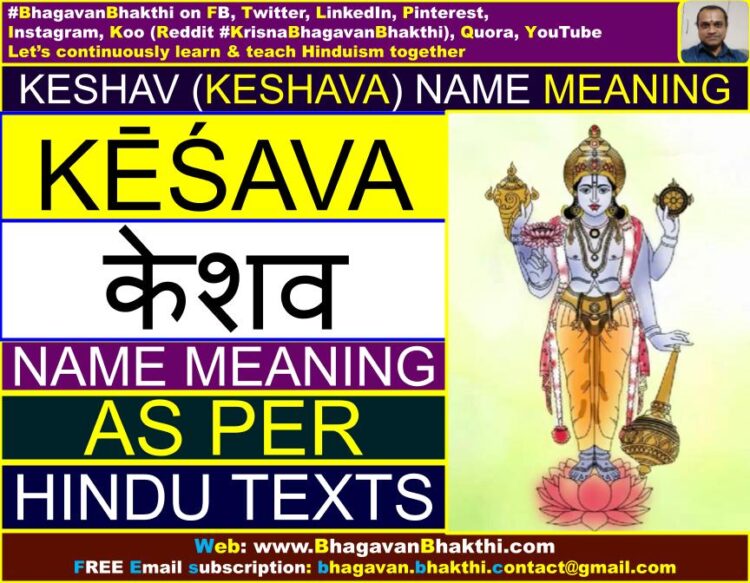
Keshava or Keshav (केशव) is one of the famous names of Bhagavan Lord Sri Vishnu (Krishna). This name Keshava is considered as ‘Moola Roopa’ (Original form) of the ‘aadi swaroopa’ (Divinely primordial) of Sarvottama / Supreme Bhagavan Lord Sri Vishnu.
Now, let us break the name Keshava (Keshav) and let us understand it’s meaning:
1. Keshava (केशव) = Ka + Isha + Va = This name is the origin and governing Bhagavan / God / Ishwar of Lord Sri Brahma Deva + Rudra Deva (Lord Shiva) and all the Devatas / Demigods.
(Lord Sri Brahma Deva takes birth from the ‘nabhi’ / navel of Bhagavan Lord Sri Vishnu and Lord Shiva takes birth from ‘manasa’ / mind of Lord Sri Brahma Deva).
2. Kesa (Kes) is a Sanskrit word which means hair (Even in many Indian languages we use this word for hair). 3. Also Kesa (Kes) means a ray of light.
4. Keshava also has the meaning someone who has got a long and beautiful golden color hair, whose hair is very charming, filled with ultimate sugandha / fragrance. 5. Keshava also means, he is someone who completely destroys his and his devotees’ enemies.
6. Also Keshava means, someone who’s continuous chanting removes sorrows and sufferings from his devotees (remover of all the klesha).
Without chanting of the word Keshava, that is, ‘Sri Keshavaaya Namaha’, none of the Vedic rituals begins as per the Sanatana Dharma Shastras.
7. Keshava means, he is the one who is the slayer of asura / demon Keshi and hence is referred as Keshiha in Vishnu Sahasranama.
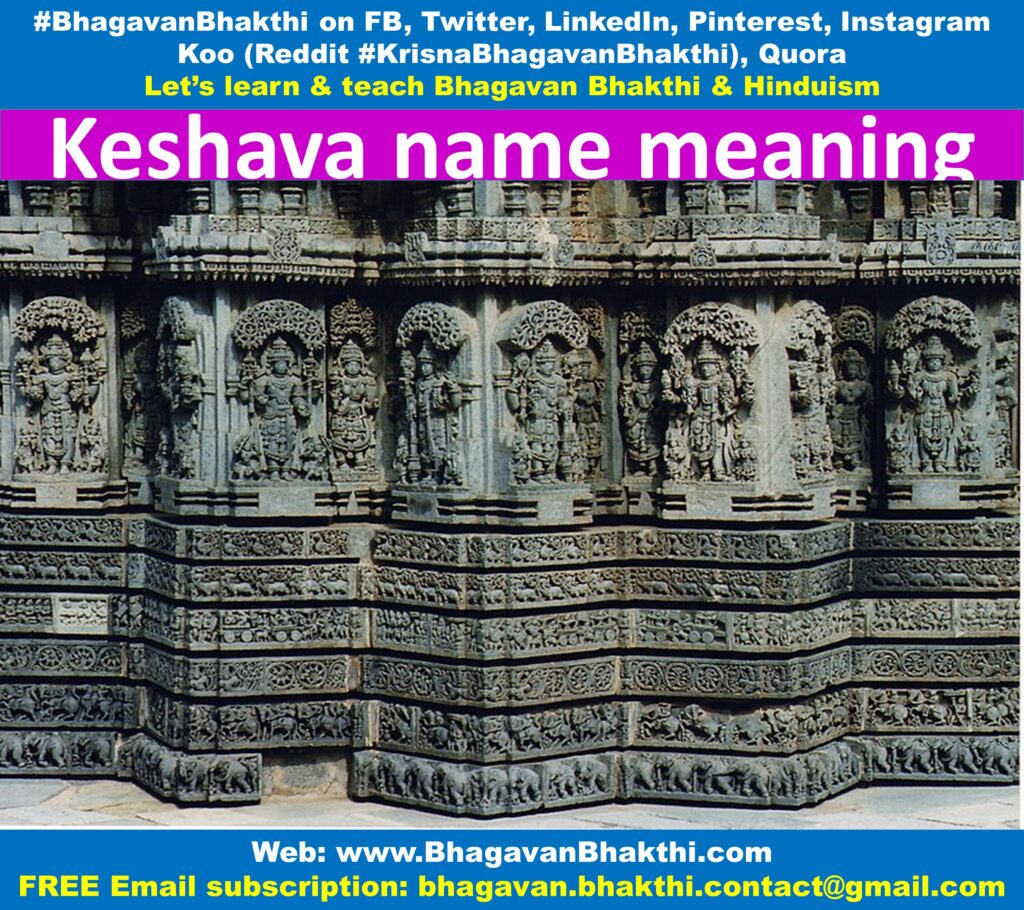
Channa Keshava Devalaya, Karnataka beautiful carvings
8. Keshiha has been given in the Sri Vishnu Sahasramana Sloka no. 69.
कालनेमिनिहा वीरः शौरिः शूरजनेश्वरः |
त्रिलोकात्म त्रिलोकेशः केशवः केशिहा हरिः || 69 ||
ಕಾಲನೇಮಿನಿಹಾ ವೀರಃ ಶೌರಿಃ ಶೂರಜನೇಶ್ವರಃ |
ತ್ರಿಲೋಕಾತ್ಮಾ ತ್ರಿಲೋಕೇಶಃ ಕೇಶವಃ ಕೇಶಿಹಾ ಹರಿಃ || 69 ||
kālanēminihā vīraḥ śauriḥ śūrajanēśvaraḥ।
trilōkātmā trilōkēśaḥ kēśavaḥ kēśihā hariḥ || 69 ||
Bhagavan Sri Krishna is prominently known as Keshava all over the world, not only by Hindus, but also by non-Hindus too.
9. We find a reference to the word Keshava is shloka no. 3 and no. 69 (See above) of Sri Vishnu Sahasranaama Stotram.
योगो योगविदां नेता प्रदान पुरुषेश्वरः |
नारसिंहवपुः श्रीमान् केशवः पुरुषोत्तमः || 3 ||
ಯೋಗೋ ಯೋಗವಿದಾಂ ನೇತಾ ಪ್ರಧಾನ ಪುರುಷೇಶ್ವರಃ |
ನಾರಸಿಂಹವಪುಃ ಶ್ರೀಮಾನ್ ಕೇಶವಃ ಪುರುಷೋತ್ತಮಃ || 3 ||
yōgō yōgavidāṁ nētā pradhāna puruṣēśvaraḥ।
nārasinhavapuḥ śrīmān kēśavaḥ puruṣōttamaḥ॥ 3॥
10. In the symbolism of Bhagavan Sri Vishnu, generally we see Bhagavan Sri Vishnu holding the divine Shankha (Panchajanya) in the left hand and Chakra (Sudarshana) in the right, whereas in the Keshava form, the ‘Aadi Chaturvimshati Roopas’ (Original 24 forms) it has interchanging Shanka and Chakra.
The ‘Chaturvimshati Roopas’ (24 forms) of Bhagavan Lord Sri Vishnu with his divine consort (wives) names are as given below:
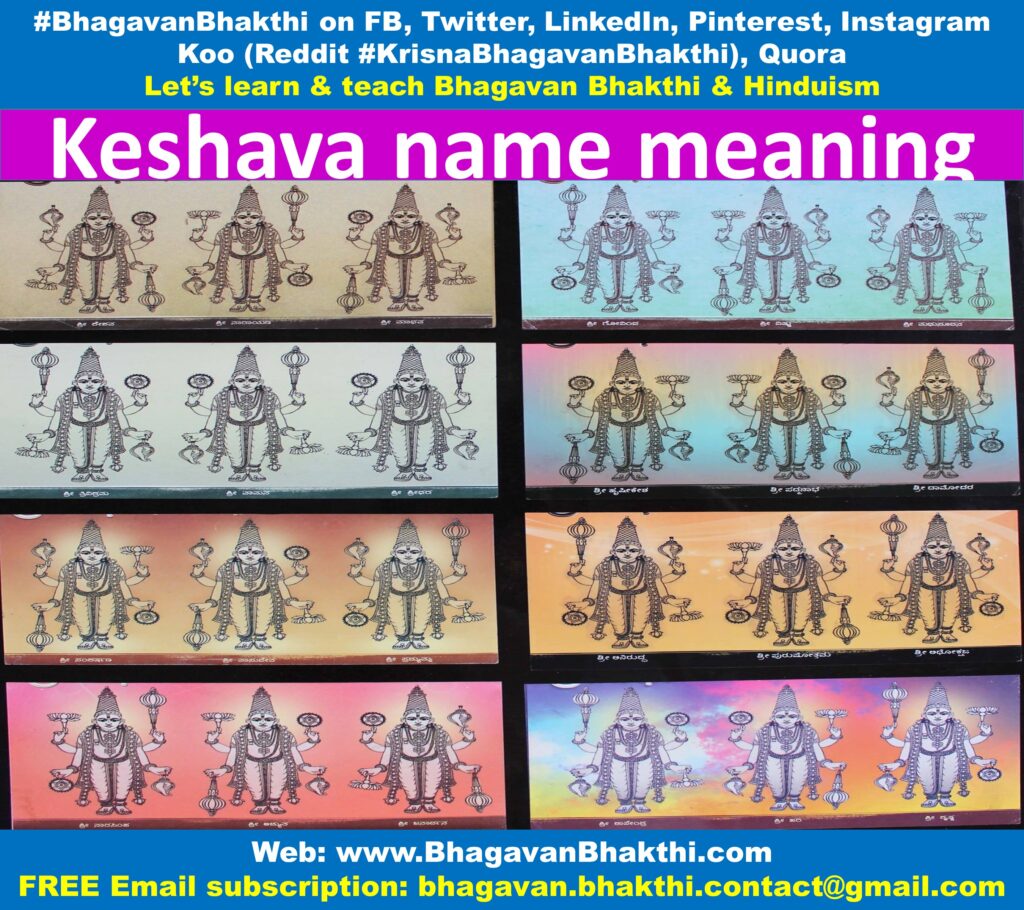
Bhagavan Sri Vishnu + Sri Maha Lakshmi Names:
Keshava + Sri | Narayana + Lakshmi | Madhava + Kamala | Govinda + Padma | Vishnu + Padmini | Madhusudana + Kamalaalaya |
Trivikrama + ramaa (रमा) | Vamana + Vrushaakapi | Sridhara + Dhanya | Rishikesha + Buddhi | Padmanabha + Yagna | Damodara + Indira |
Sankarshana + Hiranya | Vasudeva + Harini | Pradyumna + Satya | Aniruddha + Nitya | Purushottama + Ananda | Adhokshaja + Trayee |
Narasimha + Sudha | Achyuta + Sugandha | Janardhana + Sundarii | Upendra + Vidyaa | Hari + Susheela | Krishna + Sulakshana |
In the Margasira Masam (month), Keshava is its ‘abhimani devata’ (Controlling God), also called as ‘Maasa Niyaamaka Devata’.
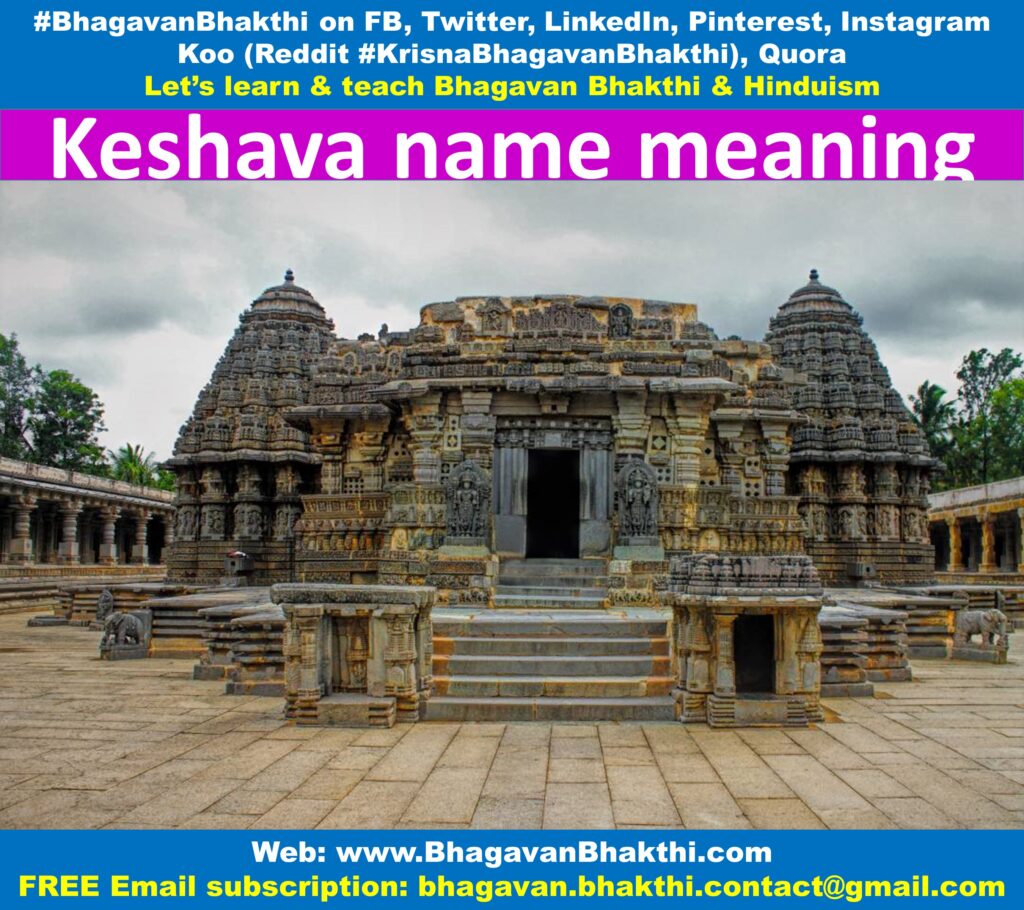
Channa Keshava Devalaya, Karnataka outside view
Let’s consider one shloka of Bhagavan Keshava:
आकाशात् पतितं तोयं यथा गच्छति सागरम् ।
सर्वदेव नमस्कारं केशवं प्रतिगच्छति ॥
ಆಕಾಶಾತ್ ಪತಿತಂ ತೋಯಂ ಯಥಾ ಗಚ್ಛತಿ ಸಾಗರಮ್ ।
ಸರ್ವದೇವ ನಮಸ್ಕಾರಂ ಕೇಶವಂ ಪ್ರತಿಗಚ್ಛತಿ ।।
ākāśāt patitaṃ toyaṃ yathā gacchati sāgaram ।
sarvadeva namaskāraṃ keśavaṃ pratigacchati ॥
Meaning of this sloka: As the rain water that falls down from the sky finally reaches the Ocean, similarly doing the regular and continuous worship of any Devatas / Demigods ultimately reaches the Sarvottama / Supreme Bhagavan Keshava (Bhagavan Sri Vishnu / Krishna).
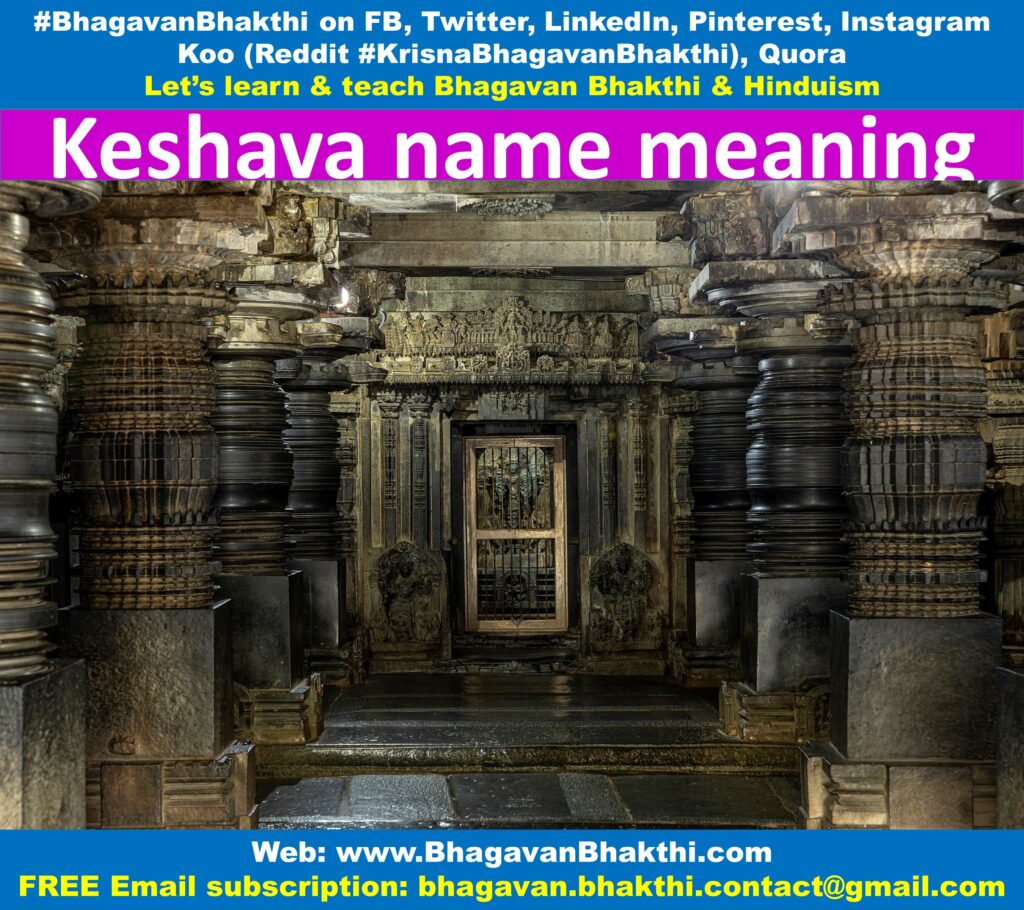
Channa Keshava Devalaya, Karnataka inside view
Thus, whatever the divine work we do, we need to do ‘samarpana‘ to Bhagavan Keshava (Bhagavan Sri Vishnu / Krishna) by saying the following shloka from Sri Vishnu Sahasranama (From Phala Shruti):
कायेन वाचा मनसेन्द्रियैर्वा बुद्ध्यात्मना वा प्रकृतिस्वभावात् ।
करोमि यद्यत्सकलं परस्मै नारायणयेति समर्पयामि || 33 ||
ಕಾಯೇನ ವಾಚಾ ಮನಸೇಂದ್ರಿಯೈರ್ವಾ ಬುದ್ಧ್ಯಾತ್ಮನಾ ವಾ ಪ್ರಕೃತೇಃ ಸ್ವಭಾವಾತ್ ।
ಕರೋಮಿ ಯದ್ಯತ್ಸಕಲಂ ಪರಸ್ಮೈ ನಾರಾಯಣಾಯೇತಿ ಸಮರ್ಪಯಾಮಿ || 33 ||
kāyēna vācā manasēndriyairvā bud’dhyātmanā vā prakr̥tēḥ svabhāvāt।
karōmi yadyatsakalaṁ parasmai nārāyaṇāyēti samarpayāmi || 33 ||
After telling the above shloka we should always end any divine work by saying the below:
|| श्री कृष्णार्पणमस्तु ||
|| ಶ್ರೀ ಕೃಷ್ಣಾರ್ಪಣಮಸ್ತು ||
|| Śrī kr̥ṣṇārpaṇamastu ||
Only after saying the above, all the divine works which has been done by us will reach Bhagavan Sri Vishnu / Keshava / Krishna.
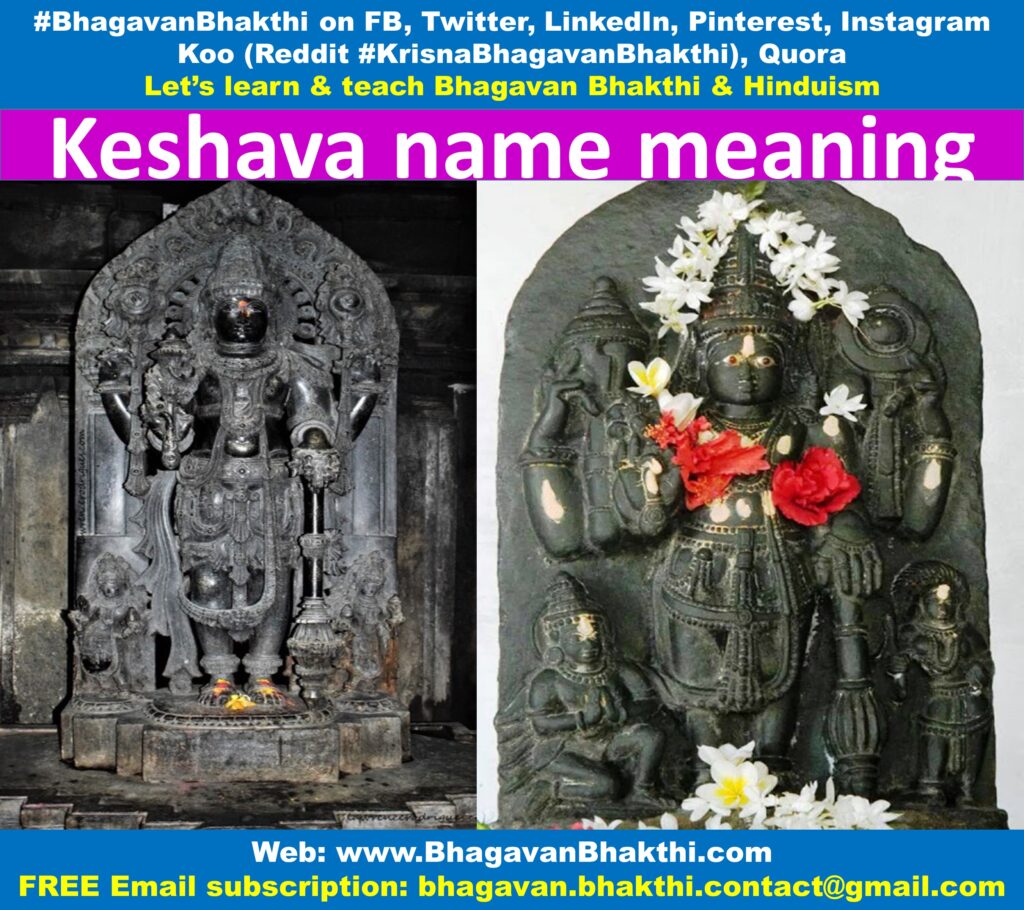
Bhagavan Lord Sri Keshava deity (A form of Lord Sri Vishnu / Krishna)
More information will be added to this on regular basis, please visit after some time to know more information.
To watch videos on #Hinduism #Sanskrit language, SUBSCRIBE to my YouTube channel from this link: #BhagavanBhakthi YouTube channel
To know stotras of Bhagavan Sri Vishnu, Rama, Krishna and other Devatas, please visit this link: Stotras of Bhagavan Sri Vishnu, Rama, Krishna and other Devatas
To know “Goddess Sri Lakshmi Ashtottara Shata namavali (108 names) with meaning in Sanskrit, Kannada and English languages”, visit this link: Goddess Sri Lakshmi Ashtottara Shata namavali (108 names) with meaning in Sanskrit, Kannada and English languages
To know “Goddess Lakshmi Shlokas (stotras) with meaning in Sanskrit, Kannada and English”, visit this link: Goddess Lakshmi Shlokas (stotras) with meaning in Sanskrit, Kannada and English
To know “What are Goddess Lakshmi names in different avatars along with Lord Hari’s names”, visit this link:
What are Goddess Lakshmi names in different avatars along with Lord Hari’s names
Dear friends, if you need any clarifications about this post, kindly let me know, I will definitely try to answer all of them.
Also your one LIKE, one COMMENT, One Share, one SUBSCRIPTION is highly important.
This will help to know the quality of this content and also it will be helpful to know if any improvements is required for the content.
If you feel this content is useful to you and has helped you to improve your knowledge, kindly share this with your well-wishers.
Because “SHARING MEANS CARING”.
To receive FREE EMAIL SUBSCRIPTION about #BhagavanBhakthi, you can send an email to bhagavan.bhakthi.contact@gmail.com from your email ID.
NAMASTE!
Sri Gurubhyo Namaha
Sri Venkateshaaya Namaha
Sri Krishnaarpanamastu
Share in Social Media